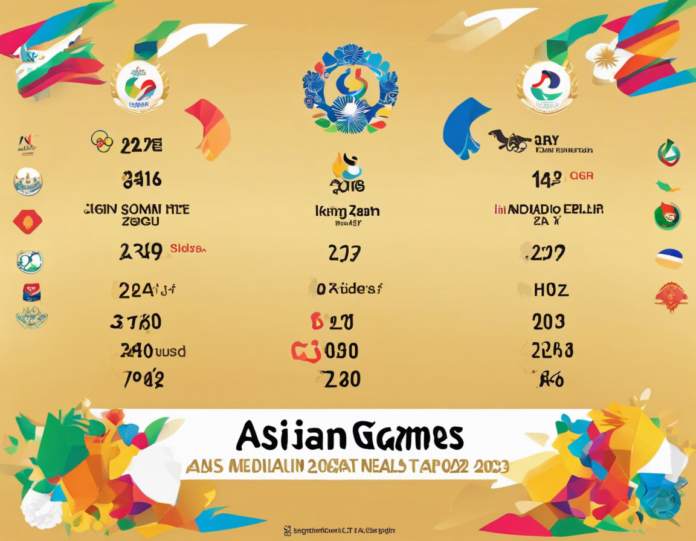The Asian Games is a multi-sport event held every four years, bringing together athletes from countries across Asia to compete in a wide range of sporting disciplines. One of the key metrics by which countries measure their success at the Asian Games is through the Gold Medal Standings. This ranking system tallies the number of gold medals won by each participating country, determining which nation performed the best overall.
Understanding the Significance of Gold Medals
Gold medals hold a special significance in the world of sports. They represent the pinnacle of achievement, showcasing the top-performing athletes in their respective disciplines. Winning a gold medal at a major event like the Asian Games is a testament to an athlete’s hard work, dedication, and talent. For countries, topping the gold medal standings at the Asian Games is a matter of national pride and can reflect the level of investment and development in sports within that nation.
Factors Influencing Gold Medal Standings
Several factors can influence a country’s performance in the gold medal standings at the Asian Games. These factors include:
- Population and Resources: Larger countries with greater resources and a larger pool of athletes to choose from may have an advantage in winning gold medals.
- Investment in Sports: Countries that invest heavily in sports development, infrastructure, coaching, and athlete training are likely to perform well in the medal standings.
- Sporting Culture: Nations with a strong sporting culture that values and promotes athletics are more likely to produce successful athletes.
- Government Support: Governments that provide funding, support, and incentives for sports programs and athletes can boost a country’s performance in the medal standings.
- History and Tradition: Countries with a strong history and tradition in certain sports may have a competitive edge in those disciplines.
Analyzing the Asian Games 2023 Gold Medal Standings
The Asian Games 2023 are set to take place in a yet-to-be-announced host city. As the event unfolds, sports enthusiasts and analysts will closely monitor the medal standings to see which countries emerge as the top performers. The gold medal standings provide a clear snapshot of which nations excel in various sports and showcase their dominance on the Asian stage.
Key Contenders for the Top Spots
Several countries have traditionally been strong contenders in the Asian Games gold medal standings. These nations have a history of success in specific sports and are expected to perform well in the upcoming games. Some key contenders include:
- China: Known for its dominance in sports like gymnastics, table tennis, and diving, China consistently tops the gold medal standings at major sporting events.
- Japan: With strong performances in judo, swimming, and athletics, Japan is a formidable competitor in the Asian Games.
- South Korea: Exceling in sports like archery, taekwondo, and short track speed skating, South Korea is a consistent medal contender at the Asian Games.
- India: With a growing emphasis on sports development and increasing success in disciplines like wrestling, shooting, and badminton, India has been steadily improving its performance at the Asian Games.
- Indonesia: As the host of the 2018 Asian Games, Indonesia showcased its strength in sports like badminton, weightlifting, and pencak silat, and will aim to maintain its competitive edge in 2023.
Predicting the Outcome
While it is challenging to predict the exact outcome of the Asian Games 2023 gold medal standings, these key contenders are likely to feature prominently at the top of the rankings. The level of competition, athletes’ form and preparation, and home advantage for the host country (once announced) will all play a role in determining the final standings.
FAQ
Q: How are ties typically resolved in the gold medal standings at the Asian Games?
A: In the event of a tie in the number of gold medals won by two or more countries, the tie is usually resolved by counting the number of silver medals, followed by bronze medals if necessary.
Q: Which sports tend to have the most gold medals available at the Asian Games?
A: Sports like athletics, swimming, and shooting often have a high number of gold medals available, making them key events in determining the overall rankings.
Q: How do countries prepare for the Asian Games to improve their chances in the gold medal standings?
A: Countries typically invest in athlete training programs, build state-of-the-art sports facilities, and provide funding and incentives to support their athletes in preparation for the Asian Games.
Q: Are there any sports that are unique to the Asian Games and not included in other major international sporting events?
A: Yes, the Asian Games feature sports like sepak takraw, kabaddi, and wushu that are not included in events like the Olympics, making the competition truly unique to the region.
Q: How do the Asian Games gold medal standings compare to other regional and international sporting events like the Olympics?
A: The Asian Games gold medal standings provide a specific focus on Asia and its sporting prowess, offering a platform for countries in the region to showcase their talent and competitiveness on a regional scale. Additionally, the Asian Games serve as a stepping stone for athletes aiming to compete at the Olympics, offering valuable experience and exposure.












